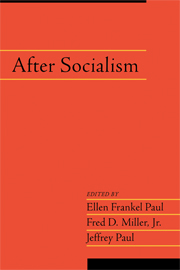Book contents
- Frontmatter
- Contents
- Introduction
- Acknowledgments
- Contributors
- Can There Be an “After Socialism”?
- The Cultural Contradictions of Socialism
- The Idol of History
- Backwards into the Future: Neorepublicanism as a Postsocialist Critique of Market Society
- What's Left of the Welfare State?
- The Roots and Rationale of Social Democracy
- An Interpretation and Defense of the Socialist Principle of Distribution
- Some Feasible Alternatives to Conventional Capitalism
- After Socialism: Mutualism and a Progressive Market Strategy
- Sovereignty, Commerce, and Cosmopolitanism: Lessons from Early America for the Future of the World
- Beyond Fear and Greed?
- Liberalism's Divide, After Socialism and Before
- INDEX
What's Left of the Welfare State?
Published online by Cambridge University Press: 01 June 2010
- Frontmatter
- Contents
- Introduction
- Acknowledgments
- Contributors
- Can There Be an “After Socialism”?
- The Cultural Contradictions of Socialism
- The Idol of History
- Backwards into the Future: Neorepublicanism as a Postsocialist Critique of Market Society
- What's Left of the Welfare State?
- The Roots and Rationale of Social Democracy
- An Interpretation and Defense of the Socialist Principle of Distribution
- Some Feasible Alternatives to Conventional Capitalism
- After Socialism: Mutualism and a Progressive Market Strategy
- Sovereignty, Commerce, and Cosmopolitanism: Lessons from Early America for the Future of the World
- Beyond Fear and Greed?
- Liberalism's Divide, After Socialism and Before
- INDEX
Summary
INTRODUCTION
What, if anything, is left of the socialist project? One way of interpreting this question is to ask whether socialism has bequeathed any permanent legacy to the capitalist democracies—do they have any features that would not exist apart from the historical impact of socialism, and that positively reflect socialist values? If we assume, with the political consensus of the moment, that full–blown socialism no longer represents a possible programme for these democracies, perhaps we can still discover the remains of socialism embedded in their practices. Or maybe not—that is the question I want to address.
Socialism can be seen as either a theory of production or a theory of consumption, or as both of these together. As a theory of production, it recommends replacing capitalist ownership and control of land, industry, and other productive assets with social ownership and control, which could take a variety of forms ranging from full ownership by the state to ownership by the particular group of workers who operate the asset in question. As a theory of consumption, it recommends replacing the individual purchase of commodities in the market with collective consumption, which again might take a variety of forms. Some goods, such as public entertainment and the natural environment, might be enjoyed jointly by everyone free of charge—this would be collective consumption in its strongest form. Other goods could be provided for individual use, but distributed equally or according to need.
- Type
- Chapter
- Information
- After Socialism , pp. 92 - 112Publisher: Cambridge University PressPrint publication year: 2003

